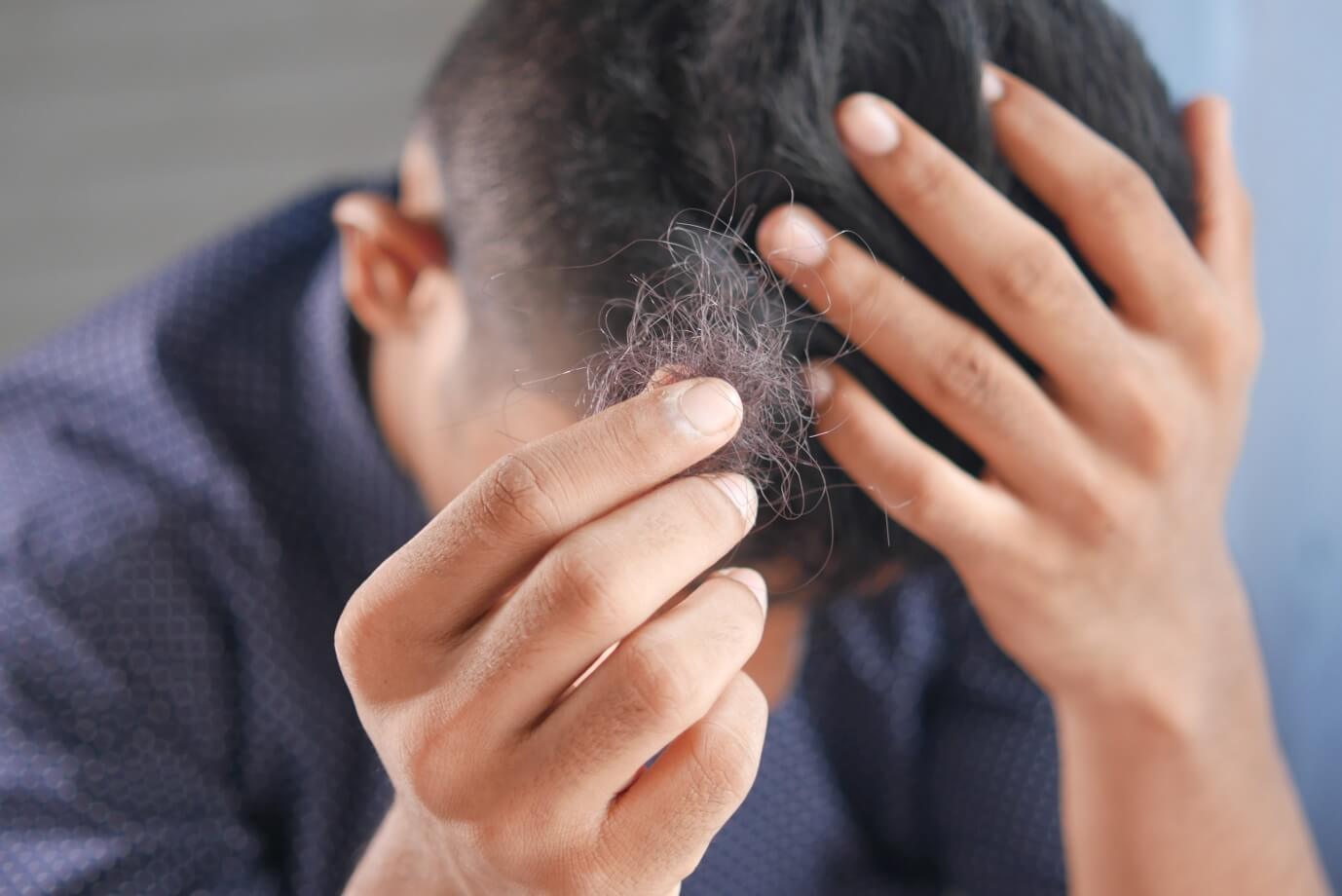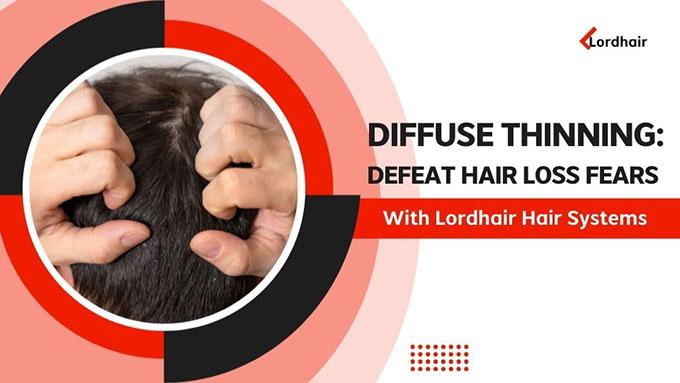Does Creatine Cause Hair Loss?
- Written by Lisa Sawter
- | Published Sep 9, 2022
- |
- 6 min read
 Listen to the full text
Listen to the full text
Creatine is one of the most well-known supplements for improving performance during short-duration high-intensity exercise, such as sprinting and lifting heavy weights. Creatine is also a favorite among athletes who frequently compete in extended bouts of high-effort activity, such as rugby and basketball players.
However, despite how common it is among active people, creatine can occasionally be associated with negative side effects. For example, there are some concerns that creatine may cause hair loss or thinning. Is this true? If so, does it only happen to certain people or all of us? Read our article and know more about creatine and hair loss.
What Can Cause Hair Loss?
The process of hair loss in men is relatively well understood. Dihydrotestosterone (DHT) can interact with hair follicles to induce hair loss. Whether a specific hair falls out or not due to DHT sensitivity or other factors, depends on its position (the crown and hairline thin first in male-pattern hair loss) and your genetic heritage.
DHT is produced from another androgen: testosterone. A specific enzyme, 5-alpha-reductase, catalyzes the conversion of free testosterone (unbound testosterone, which is not bound to either serum albumin or sex hormone binding globulin (SHBG)) to DHT. 5-alpha-reductase inhibitors, such as finasteride (Propecia), can be effective in preventing hair loss by preventing the binding of DHT to receptors on hair follicles, which causes them to shrink and cease producing hair over time.
The genetic factors that contribute to male-pattern hair loss are also not well understood. Hair loss in females, in comparison, is better understood, but the genes identified in females are thought to have less of an impact. Furthermore, DHT is considered to be less significant in female hair loss. There is, however, conflicting evidence concerning the role of other factors such as estrogen levels.
DHT and genetics are significant factors in causing male-pattern hair loss, while female-pattern hair loss is induced by less significant factors. Female hair loss is caused by factors that are less well understood than those that cause male hair loss.
Genetics, age, and certain health conditions are the primary reasons for hair loss. The duration of hair on the scalp is determined by genetics, whereas age and certain health issues increase the rate of hair loss. These three factors are responsible for normal hair loss, but there are many other reasons why hair might be lost. These include:
- Excessive styling of the hair (e.g. putting too much heat on the hair)
- Excessive pulling of the hair (e.g. traction alopecia caused by hair extensions or wigs)
- Improper hair care (e.g. not using the right shampoo or conditioner)
- Certain disorders and diseases
- Mental or emotional stress
- Certain medications
- Nutritional deficiency
- Vitamin or mineral imbalance

What Is Creatine?
The brain and muscles rely on creatine to recycle Adenosine triphosphate (ATP) into energy. ATP is the cellular energy currency, so creatine recycles it into energy to compensate for ATP deficiencies. Athletes especially seek out this nutritional supplement for extra support.
Many athletes, such as basketball, football, and rugby players, consume creatine. In addition to improving energy levels and muscle development, creatine helps improve overall performance and strength. Furthermore, many studies show that creatine may help prevent neurological disorders.
Creatine is noteworthy because the human body produces low amounts of it. The presence of creatine can have both positive and negative consequences. Before we discuss whether creatine causes hair loss, let's look at some of its benefits:
Increase in muscle cell energy levels: When you work out, creatine boosts the phosphocreatine stores that produce adenosine triphosphate; however, the rate is slow. Creatine can boost muscle performance, but it ensures you have adequate energy to last longer.
Improve muscle mass: Creatine helps increase muscle mass by boosting the speed at which muscles are built. It also lowers myostatin levels, a hormone that inhibits muscle development. In addition to improving your performance, creatine provides energy.
Ideal for high-intensity workouts: When it comes to high-performance exercises, strength and endurance are required. Furthermore, creatine may improve various aspects as you work out. It improves strength, endurance, recovery, fatigue resistance, and brainpower, in addition to providing ATP. In addition to providing ATP, creatine improves your performance by 15%.
Improve brain function: There is also evidence that creatine improves brain function. According to research, brain function requires a certain amount of ATP. With increased dopamine levels and mitochondrial activity, there will be higher concentrations of creatine. This will result in improved memory, intelligence, and other benefits.
Alleviate neurological disease: A certain type of brain damage can be prevented by increasing the concentration of phosphocreatine. According to a study using controlled mice, supplementing with creatine increased the percentage from 26% to 72%. This can slow the progression of ischemic strokes, Alzheimer's disease, and other neurological disorders.
Prevent diabetes: It has been shown that creatine helps to keep blood sugar levels low and prevents sugar from entering the muscles. However, there are no conclusive results about whether or not creatine prevents diabetes.
Improve Parkinson’s Disease: A decrease in dopamine levels is believed to be the cause of Parkinson's disease, resulting in tremors, speech problems, muscle weakness, or brain cell death. After mice with Parkinson's were given creatine, dopamine levels were found to have increased by 90%. These results, however, are not conclusive.
What Is Dihydrotestosterone (DHT)?
Dihydrotestosterone (DHT) is a testosterone-derived hormone that develops male body hair and muscle mass. Besides functioning as a sex hormone, testosterone is always essential for generating muscle mass and body hair. This is why many men have more hair than women.
Since DHT is a stronger hormone than testosterone, it can only perform the same functions after it has been converted from testosterone. Many people are unaware of how male pattern baldness and other types of hair loss are connected to this process.
Relationship between DHT and Creatine
Taking creatine supplements has been connected to hair loss because of the connection between DHT levels and creatine consumption. When you consume creatine supplements, you generate more DHT, a compound required for testosterone to function properly.
Individuals who take creatine supplements over time may experience hair loss as a result of the increased levels of DHT, which stimulate hair follicles. It's unknown whether the increased DHT levels resulting from creatine supplementation might have an impact on reproduction.
No matter how much DHT is connected with hair loss, there are several ways to manage hair loss effectively. Scalp micropigmentation is an example. The non-surgical technique of scalp micropigmentation is used to assist individuals with hair loss. This procedure involves placing a natural pigment within the dermal layer of the scalp in the precise location where hair loss occurs. This results in a natural look with no indication of hair loss. People who are experiencing hair loss have become very interested in scalp micropigmentation.
Will Taking Creatine Cause Hair Loss?
A single study conducted in South Africa in 2009 in which 20 college-aged rugby players took creatine every day for three weeks is the source of the hair-loss rumour.
They were randomized into two groups: A group of subjects was given a placebo, and the other group was given creatine monohydrate in a loading dose (25 g daily) for seven days followed by a maintenance dose (5 g daily) for fourteen days. No significant differences were observed in testosterone levels between the two groups; however, DHT levels were significantly higher on day 7 (by 0.44 ng/mL above baseline, 56.1%) and on day 21 (by 0.12 ng/mL above baseline, 40.8%) in the creatine group.
The published response to this research checked out the procedures but did not locate any statistical errors. This research tested its creatine for 25 different possible adulterants, including stimulants and androgenic steroids. None were discovered, ruling out the possibility that DHT adjustments were due to illegal contaminants.
Taking creatine supplements can cause hair loss in people over time, as the increased DHT levels speed up hair follicle cycles, resulting in hair loss. It is unknown whether the increase in DHT levels resulting from creatine supplementation affects reproductive function.
Despite the association between high DHT levels and hair loss, there are different ways to effectively manage hair loss. Scalp micropigmentation is one example. Individuals who have hair loss can benefit from scalp micropigmentation. In this procedure, a natural pigment is applied to the dermal layer of the scalp in precisely the location where hair loss has occurred. This produces an illusion of a shaved head with no signs of hair loss.
To date, no other clinical trials have corroborated the findings of the South African study on creatine and testosterone. Nevertheless, the study reached social media, and the idea that creatine causes hair loss was born.
Best male hair units and hair integration systems for hair loss
What Are the Other Side Effects of Creatine?
There are a few potential side effects and safety concerns associated with using creatine, which we will look at in more detail below.
Water retention: There has been speculation that water retention may result in dehydration and cramps, but these issues haven't been substantiated by research. However, creatine may cause water retention, which may result in temporary weight gain
.
Kidney issues: A 2018 review found that creatine did not negatively affect kidney function in healthy individuals. However, individuals with underlying kidney issues should avoid taking creatine supplements.

What Else Is There to Know about Creatine?
The Food and Drug Administration has declared creatine to be Generally Recognized as Safe (GRAS), even though it is not an FDA-approved drug. Weight gain is one of the few drawbacks of properly administered creatine, although it is usually in the form of lean muscle mass.
Despite the fact that there are some adverse effects associated with creatine supplementation, those effects are not backed by scientific research. Someone may post on a fitness message board that creatine caused hair loss after using it for a few months, but that has not been verified by research.
Hair loss is frequently the result of several factors, not just genetics. That is also true of creatine-related hair loss. A veteran triathlete may describe how creatine monohydrate powder caused hair loss and regrowth after he changed to a different supplement. That may have been his experience, but it doesn't necessarily indicate a creatine side effect.
Concluding Thoughts on Whether Creatine Causes Hair Loss
There are several benefits to taking creatine supplements, including increased muscle mass, better performance, and neurological treatment. Creatine monohydrate, when taken with high-intensity exercise, increases your body's creatine stores and generates more ATP, which helps you build muscle and prolong your workout.
However, it can cause hair loss by increasing DHT levels in the body. It's important to have your physician examine you before taking any supplements containing creatine if you're experiencing hair loss. Additionally, always take the specified dose, as larger or smaller amounts may have adverse effects.
It's also crucial to talk to your physician if you experience hair loss or other issues when taking creatine. Your physician can assist you in finding the right solution for hair loss.
Also, read our recent blog posts:
- Tips to prevent hair loss after surgery
- Causes of hair loss in teenage girls
- Tips to stop seasonal hair loss
- Easy ways to make hair thicker after losing weight
Browse these recently launched product pages as well:
- Discover human hairpieces for men
- Partial hairpieces for receding hairlines
- Discover the best hair patches for men in 2022



